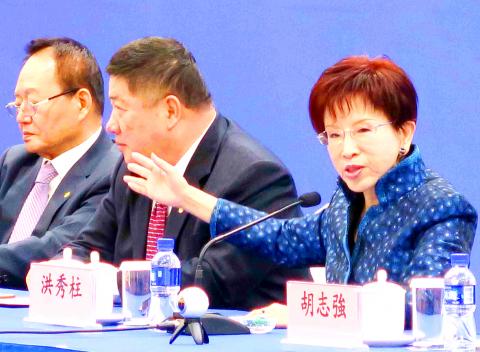The Chinese Nationalist Party’s (KMT) annual forum with the Chinese Communist Party (CCP) began yesterday in Beijing and a new panel — the political panel — was created to “explore possibilities for cross-strait political talks,” KMT Vice Chairman Steve Chan (詹啟賢) said.
At the opening ceremony, Chan said the forum has taken place since 2006 and during those years “the KMT had been in opposition, became the ruling party [in 2008] and has now again become the opposition.”
“Looking back on the 10-year history of the forum, we see that the resolutions made in the past have been adopted by the governments in each side of the Taiwan Strait and turned into policies that greatly benefited the people,” he said.

Photo: CNA
Chan said that government officials of both sides had participated in the forum over the past eight years to discuss possible policies, which was “a rare page in history.”
“That page has been brought to a temporary end and it is widely known that the cause is the denying of the ‘1992 consensus’ as a political foundation” by the Democratic Progressive Party government, he said.
As the two sides of the Taiwan Strait have experienced “more than 60 years of institutional, military and diplomatic differences, it takes time and wisdom to discuss fusing this half-century gap and that is why a new panel — the political panel — has been added to this year’s forum,” he said.
He said that while many Taiwanese political pundits have expressed doubts about holding this year’s forum, “the KMT knows that there cannot be a lack of communication across the Strait, as prosperity has only been possible in the past eight years after the KMT decided in 2005 [to hold talks with Beijing] after witnessing the cross-strait stalemate caused by [then-president] Chen Shui-bian’s (陳水扁) administration.”
This year’s forum includes five panels — political, economic, cultural, social and youth.
This year the “cross-strait economic, trade and cultural forum,” has been renamed the “cross-strait peaceful development forum.”
The change is believed to have been decided by KMT Chairwoman Hung Hsiu-chu (洪秀柱) to advance her “peace party platform,” which was passed by the party’s national congress in September and has since spawned controversy within the KMT as it calls for a peace agreement with China.
KMT Policy Committee executive director Alex Tsai (蔡正元) said that the party is not looking to replace the Straits Exchange Foundation, as it is an agency of public authority, the Chinese-language Apple Daily reported.
The KMT, working as a non-governmental organization, is constructing a KMT-CCP communication mechanism, which would not affect cross-strait dialogue at the official level, he added.
“The KMT’s and Hung’s goal is to reduce the negative effects and damage caused by [President] Tsai Ing-wen (蔡英文) to a minimum,” Alex Tsai said.

DAREDEVIL: Honnold said it had always been a dream of his to climb Taipei 101, while a Netflix producer said the skyscraper was ‘a real icon of this country’ US climber Alex Honnold yesterday took on Taiwan’s tallest building, becoming the first person to scale Taipei 101 without a rope, harness or safety net. Hundreds of spectators gathered at the base of the 101-story skyscraper to watch Honnold, 40, embark on his daredevil feat, which was also broadcast live on Netflix. Dressed in a red T-shirt and yellow custom-made climbing shoes, Honnold swiftly moved up the southeast face of the glass and steel building. At one point, he stepped onto a platform midway up to wave down at fans and onlookers who were taking photos. People watching from inside

A Vietnamese migrant worker yesterday won NT$12 million (US$379,627) on a Lunar New Year scratch card in Kaohsiung as part of Taiwan Lottery Co’s (台灣彩券) “NT$12 Million Grand Fortune” (1200萬大吉利) game. The man was the first top-prize winner of the new game launched on Jan. 6 to mark the Lunar New Year. Three Vietnamese migrant workers visited a Taiwan Lottery shop on Xinyue Street in Kaohsiung’s Gangshan District (崗山), a store representative said. The player bought multiple tickets and, after winning nothing, held the final lottery ticket in one hand and rubbed the store’s statue of the Maitreya Buddha’s belly with the other,

‘NATO-PLUS’: ‘Our strategic partners in the Indo-Pacific are facing increasing aggression by the Chinese Communist Party,’ US Representative Rob Wittman said The US House of Representatives on Monday released its version of the Consolidated Appropriations Act, which includes US$1.15 billion to support security cooperation with Taiwan. The omnibus act, covering US$1.2 trillion of spending, allocates US$1 billion for the Taiwan Security Cooperation Initiative, as well as US$150 million for the replacement of defense articles and reimbursement of defense services provided to Taiwan. The fund allocations were based on the US National Defense Authorization Act for fiscal 2026 that was passed by the US Congress last month and authorized up to US$1 billion to the US Defense Security Cooperation Agency in support of the

HIGH-TECH DEAL: Chipmakers that expand in the US would be able to import up to 2.5 times their new capacity with no extra tariffs during an approved construction period Taiwan aims to build a “democratic” high-tech supply chain with the US and form a strategic artificial intelligence (AI) partnership under the new tariffs deal it sealed with Washington last week, Taipei’s top negotiator in the talks said yesterday. US President Donald Trump has pushed Taiwan, a major producer of semiconductors which runs a large trade surplus with the US, to invest more in the US, specifically in chips that power AI. Under the terms of the long-negotiated deal, chipmakers such as Taiwan Semiconductor Manufacturing Co (TSMC, 台積電) that expand US production would incur a lower tariff on semiconductors or related manufacturing